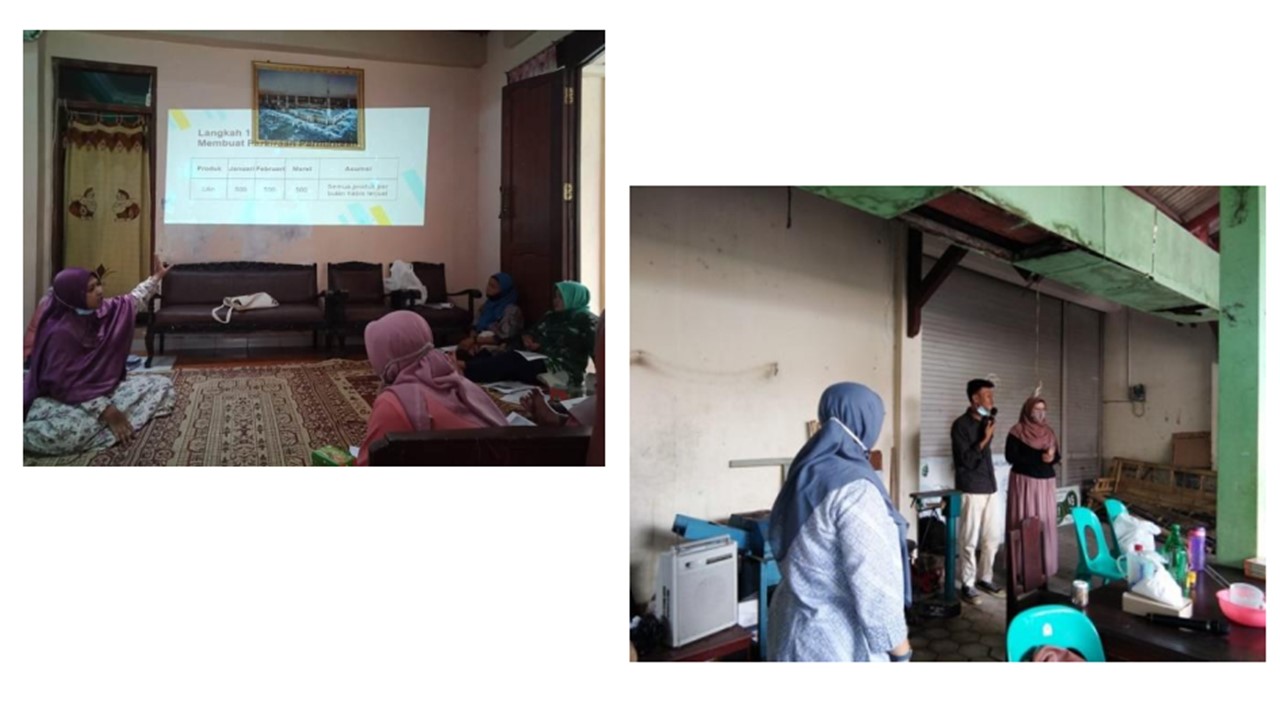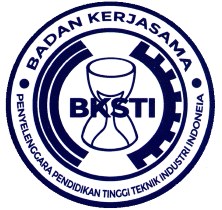PENGOLAHAN LIMBAH MINYAK JELANTAH MENJADI LILIN AROMATERAPI DI BANK SAMPAH LINTAS WINONGO, KELURAHAN BUMIJO, KECAMATAN JETIS, KOTA YOGYAKARTA
DOI:
https://doi.org/10.12928/spekta.v2i1.3701Keywords:
Waste Cooking Oil, Waste Bank, Recycled Products, Aromatherapy CandlesAbstract
Waste Cooking Oil (WCO) is the waste that came from household. WCO become a threat to community because it will come back to food chains again as residual bulk oil that have cheaper price than branded cooking oil. Lintas Winongo Waste Bank in Bumijo, Jetis, Yogyakarta City are trying to manage the waste cooking oil into recycled products. One of their products is aromatherapy candles. However, they had problem to produce the candles and sell it. They also faced problem about the odor of candle that came from WCO as raw material. The purpose of community service were to provide knowledge and skills to produce aromatherapy candles and to calculate the Cost of Goods Sold (CoGS). The methods in this activity were carried out in two stage. The first activity has organized by training and assistance in producing aromatherapy candles that mixed WCO and other ingredients. The second activity focused in calculating CoGS of candles. The results from these community service activities were increased knowledge and skills about producing aromatherapy candles. There were also increased knowledge about manage CoGS of their productsReferences
Aini, D. N., Arisanti, D. W., Fitri, H. M., & Safitri, L. R. (2020). Pemanfaatan Minyak Jelantah Untuk Bahan Baku Produk Lilin Ramah Lingkungan Dan Menambah Penghasilan Rumah Tangga Di Kota Batu. Warta Pengabdian, 14(4), 253–262. https://doi.org/10.19184/wrtp.v14i4.18539
Artwohl, M., Roden, M., Waldhäusl, W., Freudenthaler, A., &
Baumgartner-Parzer, S. M. (2004). Free fatty acids trigger apoptosis and inhibit cell cycle progression in human vascular endothelial cells. The FASEB Journal : Official Publication of the Federation of American Societies for Experimental Biology, 18(1), 146–148. https://doi.org/10.1096/fj.03-0301fje
Astuti, A., Linarti, U., & Yulistiyanto, M. (2019). Identifying Waste Cooking Oil Chains to Become an Energy Resource: Study Case in Yogyakarta. Advances in Intelligent Systems Research, 171, 228–236. https://doi.org/10.2991/icoemis-19.2019.32
Azahar, W. N. A. W., Bujang, M., Jaya, R. P., Hainin, M. R., Mohamed, A., Ngadi, N., & Jayanti, D. S. (2016). The potential of waste cooking oil as bio-asphalt for alternative binder – An overview. Jurnal Teknologi, 78(4), 111–116. https://doi.org/10.11113/jt.v78.8007
Budiarti, G. I., Wulandari, A., & Mutmaina, S. (2020). Pemanfaatan Tepung Labu Kuning Modifikasi Hydrogen Rich Water Kepada Masyarakat. SPEKTA (Jurnal Pengabdian Kepada Masyarakat : Teknologi Dan Aplikasi), 1(1), 11. https://doi.org/10.12928/spekta.v1i1.2646
Budiyanto, T., Astuti, R. D., & Purwani, A. (2020). Pelatihan Dan Pendampingan Pengolahan Sampah Menjadi Produk Bernilai Ekonomi Pada Bank Sampah Bersih Bersama Karanganom, Sitimulyo, Piyungan, Bantul. SPEKTA (Jurnal Pengabdian Kepada Masyarakat : Teknologi Dan Aplikasi), 1(2), 49. https://doi.org/10.12928/spekta.v1i2.3044
Delta. (2021). PEMANFAATAN MINYAK JELANTAH (Waste Cooking Oil) DALAM PEMBUATAN LILIN AROMA TERAPI. Jurnal Kesehatan Luwu Raya, 7(2), 127–132.
Jamilatun, S., Mulia Sitophyta, L., Amelia Universitas Ahmad Dahlan, S., Ringroad Selatan, J., & Banguntapan, K. (2020). Pemanfaatan minyak jelantah untuk pembuatan lilin sebagai alternatif mengatasi limbah domestik dan meningkatkan nilai tambah. Seminar Nasional Hasil Pengabdian Kepada Masyarakat, 0(0), 49–56.
Kuo, C. Y., & Ann, D. K. (2018). When fats commit crimes: Fatty acid metabolism, cancer stemness and therapeutic resistance. Cancer Communications, 38(1), 1–12. https://doi.org/10.1186/s40880-018-0317-9
Lupi, R., Dotta, F., Marselli, L., Del Guerra, S., Masini, M., Santangelo, C., … Marchetti, P. (2002). Prolonged Exposure to Free Fatty Acids Has Cytostatic and Pro-Apoptotic Effects on Human Pancreatic Islets. Diabetes, 51(5), 1437–1442.
Madak-Erdogan, Z., Band, S., Zhao, Y. C., Smith, B. P.,
Kulkoyluoglu-Cotul, E., Zuo, Q., … Flaws11, J. A. (2019). Free fatty acids rewire cancer metabolism in obesity-associated breast cancer via estrogen receptor and mTOR signaling. Cancer Research, 79(10), 2494–2510. https://doi.org/10.1158/0008-5472.CAN-18-2849
Oh, Y. S., Bae, G. D., Baek, D. J., Park, E. Y., & Jun, H. S. (2018). Fatty acid-induced lipotoxicity in pancreatic beta-cells during development of type 2 diabetes. Frontiers in Endocrinology, 9(JUL), 1–10. https://doi.org/10.3389/fendo.2018.00384
Sanli, H., Canakci, M., & Alptekin, E. (2011). Characterization of Waste Frying Oils Obtained from Different Facilities. Proceedings of the World Renewable Energy Congress – Sweden, 8–13 May, 2011, Linköping, Sweden, 57, 479–485. https://doi.org/10.3384/ecp11057479
Saragih, S. (2015). Gentayangan di Jakarta, Badan POM Ungkap Modus Mafia Minyak Jelantah.
Sundoro, T., Kusuma, E., & Auwalani, F. (2020). Pemanfaatan Minyak Jelantah Dalam Pembuatan Lilin Warna-Warni. Jurnal Pengabdian Masyarakat Ipteks, 6(2), 127–136.
Tsai, W. T. (2019). Mandatory recycling of waste cooking oil from residential and commercial sectors in Taiwan. Resources, 8(1), 1–11. https://doi.org/10.3390/resources8010038
Vanessa, M. C., & Bouta, J. M. F. (2017). Analisis Jumlah Minyak Jelantah yang dihasilkan Masyarakat di Wilayah JABODETABEK. Politeknik Manufaktur Negeri Bangka Belitung, (January), 1–21.
Wardani, D. T. K., Saptutyningsih, E., & Fitri, S. A. (2021). Ekonomi Kreatif: Pemanfaatan Limbah Jelantah Untuk Pembuatan Lilin Aromaterapi. Prosiding Seminar Nasional Program Pengabdian Masyarakat, 402–417. https://doi.org/10.18196/ppm.32.224
Wee, H. M., Budiman, S. D., Su, L. C., Chang, M., & Chen, R. (2016). Responsible supply chain management – an analysis of Taiwanese gutter oil scandal using the theory of constraint. International Journal of Logistics Research and Applications, 19(5), 380–394. https://doi.org/10.1080/13675567.2015.1090964

Downloads
Published
How to Cite
Issue
Section
License
Copyright (c) 2021 Amalia Yuli Astuti, Utaminingsih Linarti, Gita Indah Budiarti

This work is licensed under a Creative Commons Attribution-ShareAlike 4.0 International License.
Authors who publish with SPEKTA (Jurnal Pengabdian Kepada Masyarakat: Teknologi dan Aplikasi) agree to the following terms:
- Authors retain copyright and grant the journal the right of first publication with the work simultaneously licensed under a Creative Commons Attribution License (CC BY-SA 4.0) that allows others to share the work with an acknowledgment of the work's authorship and initial publication in this journal.
- Authors are able to enter into separate, additional contractual arrangements for the non-exclusive distribution of the journal's published version of the work (e.g., post it to an institutional repository or publish it in a book), with an acknowledgment of its initial publication in this journal.
- Authors are permitted and encouraged to post their work online (e.g., in institutional repositories or on their website) prior to and during the submission process, as it can lead to productive exchanges, as well as earlier and greater citation of published work.

This work is licensed under a Creative Commons Attribution-ShareAlike 4.0 International License.












